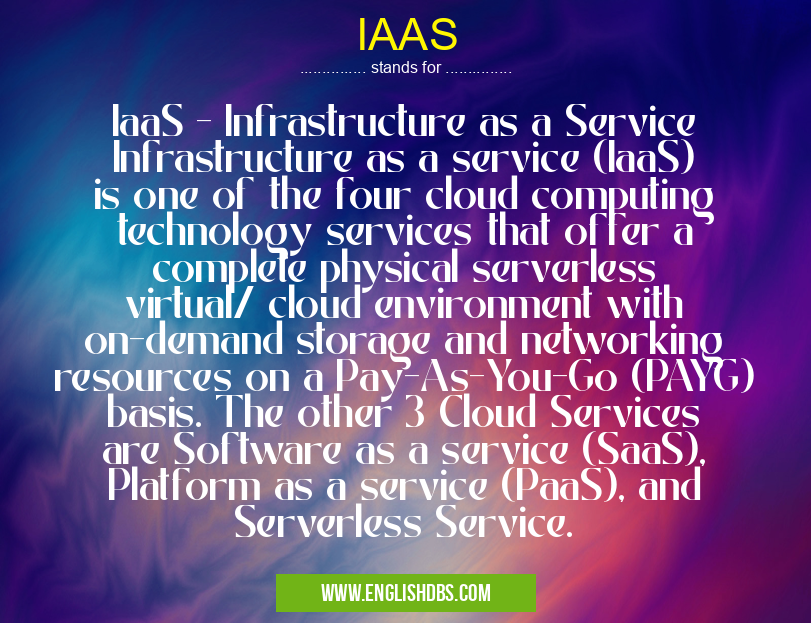What does IAAS mean in NETWORKING
IAAS stands for Infrastructure as a Service. It is a cloud computing service model that provides consumers with on-demand access to virtualized computing resources over the internet. IAAS offers a complete physical serverless virtual/cloud environment with on-demand storage and networking resources on a Pay-As-You-Go (PAYG) basis.

IAAS meaning in Networking in Computing
IAAS mostly used in an acronym Networking in Category Computing that means IaaS - Infrastructure as a Service Infrastructure as a service (IaaS) is one of the four cloud computing technology services that offer a complete physical serverless virtual/ cloud environment with on-demand storage and networking resources on a Pay-As-You-Go (PAYG) basis. The other 3 Cloud Services are Software as a service (SaaS), Platform as a service (PaaS), and Serverless Service.
Shorthand: IAAS,
Full Form: IaaS - Infrastructure as a Service Infrastructure as a service (IaaS) is one of the four cloud computing technology services that offer a complete physical serverless virtual/ cloud environment with on-demand storage and networking resources on a Pay-As-You-Go (PAYG) basis. The other 3 Cloud Services are Software as a service (SaaS), Platform as a service (PaaS), and Serverless Service.
For more information of "IaaS - Infrastructure as a Service Infrastructure as a service (IaaS) is one of the four cloud computing technology services that offer a complete physical serverless virtual/ cloud environment with on-demand storage and networking resources on a Pay-As-You-Go (PAYG) basis. The other 3 Cloud Services are Software as a service (SaaS), Platform as a service (PaaS), and Serverless Service.", see the section below.
» Computing » Networking
Key Features of IAAS
- On-demand provisioning: Consumers can access and provision computing resources as needed, without having to purchase and maintain physical hardware.
- Scalability: IAAS allows consumers to scale their computing resources up or down as their needs change, ensuring optimal performance and cost efficiency.
- Pay-As-You-Go pricing: Consumers are only charged for the resources they use, eliminating upfront capital expenses and reducing operating costs.
- Virtualization: IAAS leverages virtualization technology to create multiple virtual machines on a single physical server, maximizing resource utilization.
- Cloud-based: IAAS services are delivered over the internet, providing consumers with remote access to their computing environment from anywhere.
Benefits of IAAS
- Reduced IT costs: By eliminating the need for physical hardware, IAAS can significantly reduce IT infrastructure costs.
- Increased agility: IAAS allows businesses to adapt quickly to changes in demand or market conditions by provisioning resources on-demand.
- Improved operational efficiency: Automated resource management and provisioning capabilities streamline IT operations, freeing up resources for innovation.
- Enhanced security: Cloud providers invest heavily in security measures, ensuring the protection of consumer data and applications.
- Global reach: IAAS services are available globally, allowing businesses to expand their reach and operate in multiple regions.
Essential Questions and Answers on IaaS - Infrastructure as a Service Infrastructure as a service (IaaS) is one of the four cloud computing technology services that offer a complete physical serverless virtual/ cloud environment with on-demand storage and networking resources on a Pay-As-You-Go (PAYG) basis. The other 3 Cloud Services are Software as a service (SaaS), Platform as a service (PaaS), and Serverless Service. in "COMPUTING»NETWORKING"
What is Infrastructure as a Service (IaaS)?
IaaS is a cloud computing service that provides on-demand server, storage, networking, and other infrastructure resources. These resources are provisioned over the internet on a pay-as-you-go basis, allowing businesses to scale their infrastructure up or down as needed, without the need for physical hardware.
What are the benefits of using IaaS?
IaaS offers several benefits, including:
- Scalability: IaaS allows businesses to quickly scale their infrastructure up or down to meet changing demands.
- Flexibility: IaaS provides businesses with the flexibility to choose the specific infrastructure resources they need, and to pay only for what they use.
- Cost savings: IaaS can help businesses save money by eliminating the need for physical hardware and IT staff.
- Improved reliability: IaaS providers typically offer high levels of redundancy and uptime, ensuring that businesses have access to their applications and data even in the event of a hardware failure.
What are the different types of IaaS services?
There are three main types of IaaS services:
- Compute: Compute services provide access to virtual machines (VMs) that can be used to run applications and workloads.
- Storage: Storage services provide access to cloud-based storage that can be used to store data, backups, and archives.
- Network: Network services provide access to cloud-based networking resources, such as virtual private networks (VPNs) and load balancers.
Who are the major IaaS providers?
The major IaaS providers include Amazon Web Services (AWS), Microsoft Azure, Google Cloud Platform, and IBM Cloud. These providers offer a wide range of IaaS services, including compute, storage, network, and application services.
Final Words: IAAS is a transformative cloud computing service that offers businesses a scalable, cost-effective, and agile way to meet their computing needs. By leveraging the benefits of virtualization, on-demand provisioning, and cloud-based delivery, IAAS enables organizations to innovate faster, reduce costs, and improve their operational efficiency.
